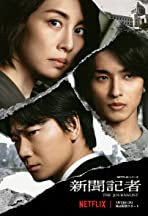We often wonder how did someone get to be the "boss"? Was it hard work and talent? For many it is. Most of realize that it is in our best interest to reward hard work and talent. But others, especially short term thinkers want to do whatever it takes to get what they want as soon as practical. What they want usually is related to money or power.
The lead reporter Matsuda recognizes a government deal is not right and wants to expose it. A scandal that we realize from the start has its origins at the top. Being at the top means having power. Society depends on the rational use of power, but we all know there is much abuse.
Journalists get a bad rap, seemingly more interested in a scoop than facts. In all cases they have to be responsive to what their bosses want and in turn we realize their bosses are under pressure. On the other hand we as consumers (including for entertainment), many of us love it when the big guy is exposed. If too close to our vested interests we might be part of the problem.
There are the crooked insiders, the coerced insiders, the hurt family, the crusading reporter and in this version an impressionable youth.
The bad guys look with their dirty tricks and intimidation like they are going to get away with it. Japan has a reputation to us outsiders as place where a suicide is more common. In this case an honest bureaucrat is forced to alter some details to protect his boss(es). He realizes a lot of harm to others will be done and despite his efforts to reverse. He cannot live with the guilt and commits suicide which I would classify as altruistic) He left a suicide note for his wife with one page expressing his sorrow at letting her down and the second page with details of what he had been forced to do. She decides to keep it to herself and is resentful of people (especially reporters) at intruding into her life.
We meet a young boy (late teens) who delivers newspapers, but declares he is not interested in the news. A girl the same age mocks him, but also encourages him to take an interest. It is his uncle that he admires who is the one who commits suicide
An interesting technique is to parallel reporter questions on two separate issues In one instance the reporter is asking tough questions about the scandal. In another the young trainee reporter is asking the original girl about her prospects. Coronovirus intrudes as it affects the girl's job offer.
The ending is unresolved. We know that a journalist has forced the issue to court and that is the point. A young man is inspired and that is another point.
I was impressed with the message and the presentation. The cast and crew that made it possible are only partly recognized. Here are a few notes:
Michihito Fuji directed and was one of the main writers. She also directed and wrote another film "The Journalist" (2019) that had been based on the same author.
Isoko Mochizuki wrote the book based on her own personal experiences as a journalist. She has been involved with the two films plus a documentary on the filming.
Ryoko Yonekura played the lead character as an aggressive journalist who was also empathetic. She has been acting in films since 2000.
Ryusei Yokohoma played the naive young man who ended up training to be a journalist. He is very likable. Despite his apparent youth he has over 40 screen credits including many series.
Another recent excellent Japanese series on Netflix: http://www.therealjohndavidson.com/2021/12/japan-sinks-people-of-hope-emigration.html

No comments:
Post a Comment